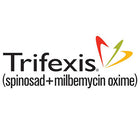Metacam (Meloxicam) Oral Suspension
METACAM for Dogs oral suspension, also called meloxicam, is an approved NSAID for managing pain and inflammation related to osteoarthritis. Osteoarthritis is a chronic and progressive disease that cannot be cured, necessitating lifelong management for your dog. Managing pain and inflammation is a significant aspect of osteoarthritis management, and non-steroidal anti-inflammatory drugs (NSAIDs) such as METACAM oral suspension are known for their reliable safety and effectiveness in controlling joint pain and inflammation. METACAM, the initial NSAID offered in oral suspension form, provides a very convenient treatment choice for dog owners and enables precise dosing for dogs of all sizes, which chewable tablets may not always achieve. Metacam must be prescribed by your vet.
- Effectively manages pain and reduces inflammation.
- Increases your dog's freedom of movement
- Includes a graduated syringe with weight measurements for easy and precise dispensing of the correct amount of oral suspension.
- Can be given directly to your dog by mouth, or mixed into your dog's food.
- Delicious flavor
Prescription items are NON-RETURNABLE and NON-REFUNDABLE.
Please note product may arrive in a Hardy Paw Pharmacy vial, manufacturer packaging is shown for reference.
Dosage and Administration:
Your vet will assess the possible advantages and dangers of METACAM and other options before choosing to use METACAM. Utilize the minimal efficient amount for the briefest period in line with personal reaction. Administer METACAM at a dosage of 0.09 mg/lb (0.2 mg/kg) body weight specifically on the initial day of treatment. For every treatment starting on day 2 and beyond, METACAM should be given once a day at a dosage of 0.045 mg per pound (0.1 mg per kilogram). The syringe is designed to administer the daily maintenance dosage based on weight in pounds. Please take into account your dog's weight and the concentration of METACAM to decide the dosage and administration method using the Client Information Sheet.
Metacam dose for Dogs
Dogs under 10 pounds (4.5 kg)
Shake well before use, then remove the cap. Particular care should be given to the accuracy of dosing. To prevent accidental overdosing of small dogs, administer drops on food only, never directly into the mouth. Carefully measure suspension onto food to ensure that the correct dose is given before the presentation of the food to the dog. The syringe provided with the meloxicam concentration of 1.5 mg/mL cannot be used to measure doses for dogs weighing less than 5 lbs (2.3 kg).
For dogs less than 5 lbs (2.3 kg), METACAM Oral Suspension can be given using the dropper bottle: one drop for each pound of body weight for the 1.5 mg/mL concentration (two drops for each kilogram of body weight), dropped directly onto the food.
For dogs between 5 - 10 pounds, METACAM Oral Suspension can be given by drops or by using the measuring syringe provided in the package (see dosing procedure below). The syringe fits onto the bottle and has a scale beginning at 5 lbs, designed to deliver the daily maintenance dose (0.05 mg/lb or 0.1 mg/kg). When using the syringe, the dog’s weight should be rounded down to the nearest 5-pound increment. Replace and tighten the cap after use.
Dogs over 10 pounds (4.5 kg)
Shake well before use then remove cap. METACAM Oral Suspension may be either mixed with food or placed directly into the mouth. Particular care should be given to the accuracy of dosing. METACAM Oral Suspension can be given using the measuring syringe provided in the package (see dosing procedure below). The syringe fits onto the bottle and has a scale in pounds designed to deliver the daily maintenance dose (0.05 mg/lb or 0.1 mg/kg). When using the syringe, the dog’s weight should be rounded down to the nearest 5-pound increment. Alternatively, METACAM Oral Suspension can be given using the dropper bottle: one drop for each pound of body weight for the 1.5 mg/mL concentration (two drops for each kilogram of body weight). Replace and tighten the cap after use.

Contraindications:
Dogs with known hypersensitivity to meloxicam should not receive METACAM Oral Suspension. Do not use METACAM Oral Suspension in cats. Acute renal failure and death have been associated with the use of meloxicam in cats.
Warnings:
Not for use in humans. Keep this and all medications out of reach of children. Consult a physician in case of accidental ingestion by humans. For oral use in dogs only.
As with any NSAID, all dogs should undergo a thorough history and physical examination before the initiation of NSAID therapy. Appropriate laboratory testing to establish hematological and serum biochemical baseline data is recommended before and periodically during administration. Owners should be advised to observe their dogs for signs of potential drug toxicity and be given a client information sheet about METACAM.
Precautions:
The safe use of METACAM Oral Suspension in dogs younger than 6 months of age, dogs used for breeding, or pregnant or lactating dogs has not been evaluated. Meloxicam is not recommended for use in dogs with bleeding disorders, as safety has not been established in dogs with these disorders.
As a class, cyclo-oxygenase inhibitory NSAIDs may be associated with gastrointestinal, renal, and hepatic toxicity. Sensitivity to drug-associated adverse events varies with the individual patient. Dogs that have experienced adverse reactions from one NSAID may experience adverse reactions from another NSAID. Patients at greatest risk for renal toxicity are those who are dehydrated, on concomitant diuretic therapy, or those with existing renal, cardiovascular, and/or hepatic dysfunction. Concurrent administration of potentially nephrotoxic drugs should be carefully approached. NSAIDs may inhibit the prostaglandins that maintain normal homeostatic function. Such anti-prostaglandin effects may result in clinically significant disease in patients with underlying or pre-existing disease that has not been previously diagnosed. Since NSAIDs possess the potential to induce gastrointestinal ulcerations and/or perforations, concomitant use with other anti-inflammatory drugs, such as NSAIDs or corticosteroids, should be avoided. If additional pain medication is needed after administration of the total daily dose of METACAM Oral Suspension, a non-NSAID or non-corticosteroid class of analgesia should be considered. The use of another NSAID is not recommended. Consider appropriate washout times when switching from corticosteroid use or one NSAID to another in dogs. The use of concomitantly protein-bound drugs with METACAM Oral Suspension has not been studied in dogs. Commonly used protein-bound drugs include cardiac, anticonvulsant, and behavioral medications. The influence of concomitant drugs that may inhibit the metabolism of METACAM Oral Suspension has not been evaluated. Drug compatibility should be monitored in patients requiring adjunctive therapy.
Metacam for dogs' side effects
METACAM (meloxicam oral suspension) is intended for oral administration to dogs exclusively. The frequent use of meloxicam in cats has been linked to sudden kidney failure and mortality. Avoid giving meloxicam to cats by mouth. Refer to Contraindications, Warnings, and Precautions for in-depth details. Cyclo-oxygenase inhibitory NSAIDs, when used collectively, could lead to gastrointestinal, renal, and hepatic toxicity. Vomiting and soft stool or diarrhea are the most frequent adverse reactions. Generally, these side effects are mild and impact the gastrointestinal system mostly, although more severe reactions could potentially arise. Hence, NSAIDs must only be given with guidance from a qualified practitioner. If you observe any adverse reactions in your dog while on medication, discontinue the drug and contact your vet. Before starting treatment with METACAM, it is important to assess dogs for any existing health conditions and medications they are currently taking. Dogs should be closely monitored throughout their time on METACAM treatment. Avoid or closely monitor concurrent use with other NSAIDs, corticosteroids, or nephrotoxic medications. Not intended for human use. Ensure that all medications are kept away from children. If humans accidentally consume the substance, seek advice from a doctor. METACAM Oral Suspension should not be given to dogs who have a known sensitivity to meloxicam. Kindly consult the complete prescribing information provided.
Storage Instructions
Keep in a location with regulated room temperature, between 68-77°F (20-25°C). Trips are allowed within the temperature range of 59 to 86°F (15 to 30°C). Short-term exposure to temperatures reaching 104°F (40°C) can be endured as long as the average kinetic temperature stays under 77°F (25°C); although, it should be kept to a minimum.
FAQ
- How long does metacam last?
- Metacam, or meloxicam, may have different durations of action due to factors like the dog's individual metabolism, the seriousness of the condition being treated, and the dosage given. Overall, Metacam is created to offer pain relief and reduce inflammation in dogs for around 24 hours following one dose. Nevertheless, the precise length of time the effects last can vary among dogs, leading to some dogs feeling better for a little longer or shorter time frames. Following your vet's dosing instructions and administering Metacam as directed is crucial to effectively manage your dog's pain and inflammation. If you have any questions regarding how long Metacam will act or its effectiveness for your dog, seek advice and suggestions from your vet for personalized help.
- What is in metacam for dogs?
- Metacam for canines includes meloxicam as its active component and is classified as a nonsteroidal anti-inflammatory drug (NSAID). Meloxicam is a strong suppressor of the enzyme cyclooxygenase (COX), which creates inflammatory substances in the body. Meloxicam works by inhibiting COX activity, leading to decreased inflammation, pain relief, and enhanced movement in dogs suffering from osteoarthritis, joint pain, and postoperative pain.
- Metacam for dogs, aside from containing meloxicam as its active ingredient, may also include other inactive components like glycerol, polysorbate 80, sodium benzoate, sodium citrate dihydrate, citric acid monohydrate, and water. These non-active components are utilized in creating the medication and can differ based on the particular formulation and producer. Following the dosing instructions from your vet and using Metacam under veterinary supervision is crucial for the safe and effective treatment of your dog's condition.
- How long can a dog be on metacam?
- For short-term use, dogs can typically be on Metacam for a few days to a few weeks. Long-term use requires careful monitoring due to potential side effects.
- What will occur if I give the pet too much Metacam?
- Look for immediate veterinary medical care. Signs of an excessive dose of Metacam may consist of feeling sick, throwing up, stomach discomfort, passing out, drowsiness, a headache, heart failure, stomach ache, convulsions, minimal or no urine output, and slow respiration.
- What should I refrain from when giving Metacam to my pet?
- Numerous non-prescription cough, cold, allergy, and pain medications include aspirin or other NSAIDs like Metacam. Before using any prescribed or non-prescribed drugs, consult with a veterinarian or pharmacist.
- What potential adverse effects can Metacam cause?
- Vomiting and soft stool or diarrhea are the most frequently reported side effects. Typically, these side effects are mild and mainly impact the digestive system, although more severe reactions may also happen. Hence, NSAIDs must be given only under the guidance of a qualified professional. If you observe any adverse reactions in your dog while undergoing treatment, discontinue the medication and contact your veterinarian. Kindly consult the complete prescribing details for further information.
Recommended for the Metacam (Meloxicam) Oral Suspension, 1.5 mg/ml
Product title
Vendor
$19.99 | $24.99
Product title
Vendor
$19.99 | $24.99
Product title
Vendor
$19.99 | $24.99
Product title
Vendor




































